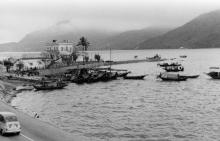22 Apr 1942, Chronology of Events Related to Stanley Civilian Internment Camp
Primary tabs
Death of A. W. J. Simmons, aged 61.
Mr. Simmons was a Catholic and former resident of Erinville, near Stanley. He died of heart failure, and the doctors say it was brought on by malnutrition. He was buried at 6 p.m. 'in the local cemetery, where the row of new graves is steadily lengthening'. A funeral mass is held for him on the 23rd.
Diplomat Sir Arthur Blackburn - accompanied by Lady Blackburn - is taken from Stanley to the French Hospital for leg X-rays. Both Dr Selwyn-Clarke and Dr Court impress on him that a serious humanitarian crisis is looming in Stanley and in the rest of the Colony: the Japanese are sending food out of Hong Kong and not bringing stocks in. They forecast conditions will become desperate about the end of July and want the British Foreign Office to be told that if no relief can be provided they should arrange to have the British community repatriated. Blackburn writes a short message on these lines to John Reeves, the British Consul in Macao, and Selwyn-Clarke indicates he can get it through.
Sources:
Simmons: Geoffrey Emerson, Hong Kong Internment, 1973, 271; Maryknoll Diary, April 22/23
Blackburn: 'Patients Brought From Stanley to St. Paul's (French) Hospital' - list drawn up by Dr. Selwyn Selwyn-Clarke, in Archives of the International Committee of the Red Cross BG017 07-61
Note 1:
Sir Arthur Blackburn's own account gives April 21 as the day he was taken to the French Hospital, but the list drawn up by Selwyn-Clarke for the Red Cross, gives today's date, and this is confirmed by Eric MacNider's diary. Barbara Anslow's diary tells us Selwyn-Clarke came to camp himself so presumably escorted the Blackburns on the journey.
This was the beginning of the system whereby patients from Stanley were allowed a short stay in the French Hospital for X-rays. Tomorrow Blackburn will be returned and Dr. Dean Smith will replace him.
Note 2:
Conditions in town did deteriorate over the summer, but those in Stanley improved as rations were increased by the Japanese and the change from having bread sent in from the uninterned bakers working at the Ching Loong to having a camp flour ration also bolstered the health and morale of the internees - the town bakers were not always able to get the supplies they needed so production and quality were erratic.

